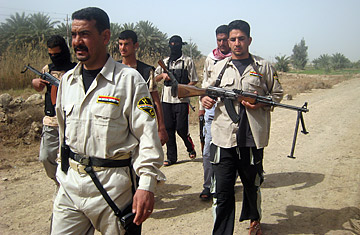
Members of the Awakening movement on patrol in 2008
(This is the ninth part of the Return to Baghdad series by Ghosh and Nate Rawlings.)
Now that Nate's brothers-in-arms are mostly gone from Anbar province, how is the American presence remembered? Anbar province is where U.S. troops fought bloody battles with Iraqi insurgents, so a lingering hatred is to be expected. But some warm feelings wouldn't be entirely surprising: the two sides eventually cooperated to defeat al-Qaeda, and the U.S. military has poured vast sums of cash into the province, for compensation and reconstruction.
To understand the legacy of the seven-year U.S. presence here — and by extension the entire country — Nate and I traveled to al-Hamdiyah, a cluster of hamlets along the Euphrates north of the provincial capital Ramadi. The dominant tribe, the Albu Fahed, prides itself for having resisted the U.S. military to the point where "every family lost a son, or had one injured, in the fighting," says Sheikh Abdel Jabbar al-Feydawi.
As elsewhere in Anbar, the insurgents were led by former Ba'athists and military officers. But some in this community of around 2,500 souls also signed up with al-Qaeda and gave shelter to fighters from elsewhere in the Islamic world. In time the second group grew dominant. At the end of 2005, this was deep al-Qaeda territory: the date-palm orchards (some of which looked very familiar to me from many viewings of propaganda videos) hid training camps where recruits were taught to assemble IEDs and conduct guerilla operations. Here, too, suicide bombers were brought for their indoctrination before their final mission. Al-Qaeda even had a prison here, in a converted chicken farm, where captives suffered brutal torture: walking around it with Feydawi, we found a part of a human jawbone, a grisly reminder of an all-too-recent atrocity. (In keeping with Muslim tradition, our colleague Ali al-Shaheen immediately buried the jawbone.)
Al-Qaeda began to impose its extreme interpretation of Islam on Hamdiyah, closing schools, banning cigarettes and alcohol, and requiring all men to swear an oath of fealty. Punishments were dire: smokers had a finger cut off, drinkers were killed. The last straw came in early 2006, when al-Qaeda fighters killed Feydawi's older brother.
On inheriting the tribal leadership, al-Feydawi gathered a group of men who had similarly lost dear ones to al-Qaeda, and began to fight back. By the end of the year, he had set up a local police force and was winning the fight. Tribes across Anbar were doing much the same, many of them working with the U.S. military in a campaign known as the "Awakening." Gen. David Petraeus, then commander of the so-called Multi-National Task Force in Iraq, poured hundreds of millions of dollars into the campaign. Some of the sheikhs have since become very wealthy businessmen.
Feydawi, however, says he only accepted some arms and ammunition from the Americans, never any money. "I would never allow my son, or his son after him, to be told, 'You're rich because your father took American money,'" he says. Although he eventually made peace with the U.S. military so he could concentrate his energies on al-Qaeda, the sheikh has nothing but loathing for the Americans. "They are dirty killers," he says, "and whether 40 years from now or 100, what they did here will not be forgotten."
Halfway through our meeting with Feydawi, we were joined by the chieftain of the neighboring Abu Ali Jassim tribe, Sheikh Dahir Sahar al-Duaywi. He was one of the early adapters of the Awakening campaign, and worked much more closely with Americans. He agreed with Feydawi that the U.S. had greatly wronged his people, but seemed to distinguish between the Marines ("They were, as my brother says, dirty killers") and the Army ("They were more respectful, more cooperative.")
Duaywi has especially fond memories of Capt. Travis Patriquin of the 1st Armored Division, who worked with several Anbar tribes in the Awakening. Patriquin was so well-liked, the sheikhs gave him an Iraqi name: Husham. "He was a wonderful guy, very familiar with tribal culture," says Duaywi. He remembers driving through dangerous neighborhoods with "Captain Husham" in his car, with the American wearing a dishdasha (an Arab robe) to avoid attention. When Patriquin was killed by an IED in late 2007, the sheikhs named a police station after him near Ramadi.
Nate and I could probably have guessed going in that the people Anbar would not have an unanimous view of the U.S. military presence. But to have the discussion in Hamdiyah, once the heart of Al Qaeda's operations in Iraq, with men who once regarded the U.S. military as a mortal enemy, showed us just how complicated the American legacy will be.
